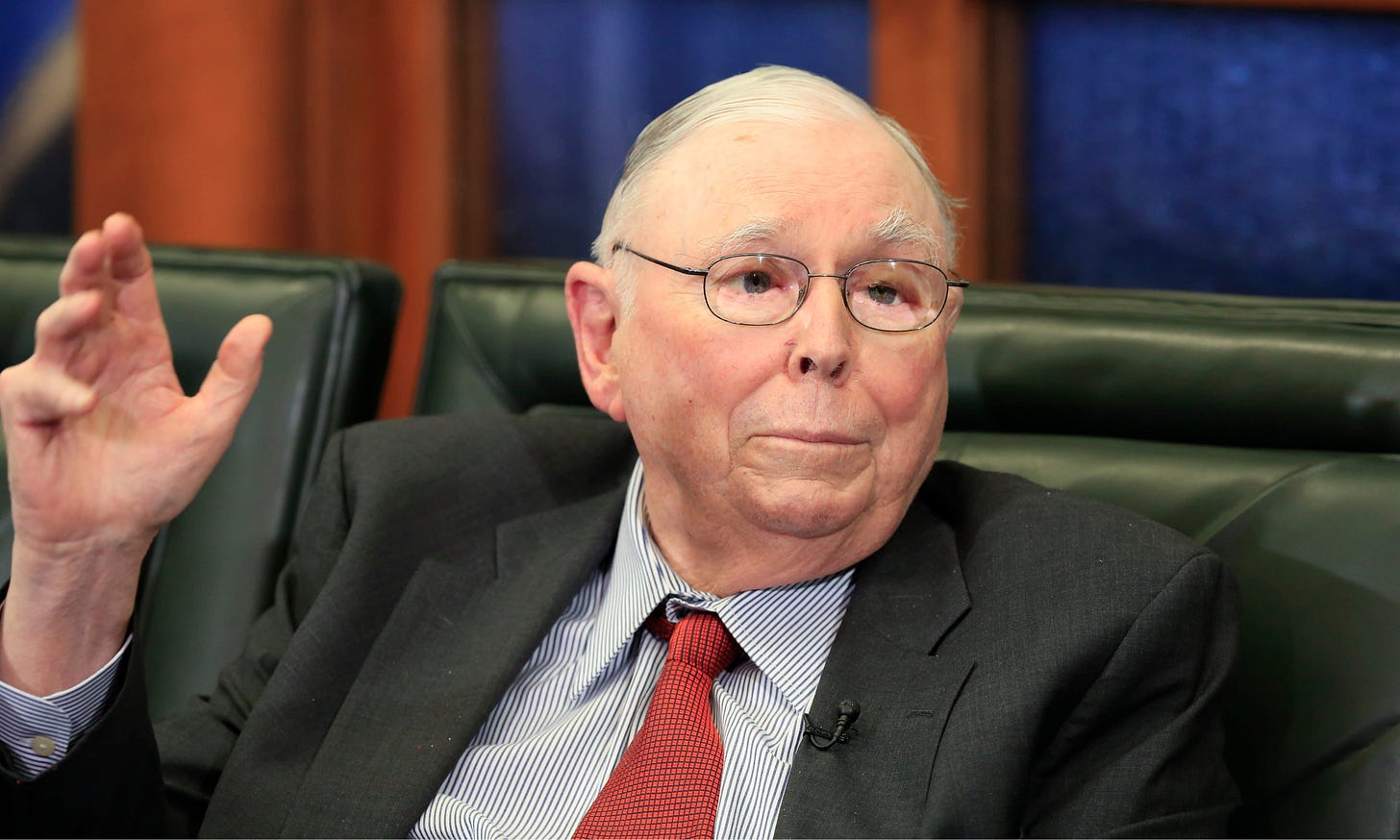The Immense Value of Studying Mistakes
The now late Charlie Munger's strength and greatness, his business partner Warren Buffett said, was focusing more on mistakes than success
Charlie Munger of Berkshire Hathaway passed away just over two weeks ago after a life of 99 years. Warren Buffett, his business partner and friend says that what stood out about Munger was his interest and competency in understanding mistakes.
He “…has always emphasized the study of mistakes rather than successes, both in business and other aspects of life,” Buffett said.
What if most people are focusing on the wrong thing — success — and instead should be looking at the mistakes.
“My system in life is to figure out what’s really stupid and then avoid it,” Munger said. “It doesn’t make me popular, but it prevents a lot of trouble.”
His bigger motivation was what could be gained, not just avoided.
“It is remarkable how much long-term advantage people like us have gotten by trying to be consistently not stupid, instead of trying to be very intelligent,” he said.
Most people are taught to learn from mistakes and not repeat them and instructed to not be stopped by the fear of failure. They are to prove resilient and keep going. Munger wasn’t talking about all failing though because that happens in life.
“I avoided the standard ways of failing, because my game in life was always to avoid all standard ways of failing,” Munger told CNBC’s Becky Quick. “You teach me the wrong way to play poker and I will avoid it. You teach me the wrong way to do something else, I will avoid it. And, of course, I’ve avoided a lot, because I’m so cautious."
Sidestepping or going around these common errors might seem like common sense yet it isn’t always is practiced.
“My sense is that there are myriad of risk versus opportunity thresholds that present themselves in the course of ordinary life,” says Bill Catlette, executive coach and advisor and a partner at Contented Cow Partners, a leadership and workforce advisory practice. “The most common and preventable ‘standard way of failing’ involves ignoring the internal risk versus reward guidance architecture that each of us has built up over the course of life.
“It's our internal operating code presented so well in Meatloaf's ‘I'd do Anything for Love,’ song. Too often, we conveniently forget about the "but I won't do that" part,” Catlette adds.
Success, it’s been said and written, can come from what we do and also what we stop doing.
“To me, establishing sensible personal boundaries for risk against which all serious decisions are weighed is a fairly straightforward proposition, but it's not a set-and-forget type of thing,” Catlette says. “If seventy trips around the sun, a long marriage, parenthood two times and three business startups have taught me anything, it's that, not unlike the oil filter in our car, our internal gyroscope and limiters need periodic inspection.”
The benefit should naturally happen because of it.
“This leads to recalculation of the governing thresholds for things that we will and won't do. Thank you Mr. Meatloaf. But in turn, it does one good to periodically refresh our memory of the pain usually suffered on those occasions when we've broken faith with our own internal code,” Catlette says. “Change the code if new realities suggest that it's wise to do so, but don't pretend that you forgot it.”
Not all failure of course should be viewed the same.
“For better or worse, I see failing on a couple different levels,” Catlette says. “Level 1 may come from taking measured risks that don't prove meritorious. Nobody who goes into the batter's box bats 1,000 for very long. The failure there is not learning and adapting from the realities presented. You take your swing, you learn and move on. You come back smarter and a little more prepared the next time. If you discover that you can't hit a curve ball, either learn to do so, or stop swinging at them.”
He talks about a recent professional experience.
“Just last week I was coaching a 23 year-old recent college grad who's in her first real job. Her reason for coming to me was the feeling that she's making too many mistakes,” Catlette recalls. “Upon concluding that the mistakes she was referring to consist of common, garden-variety occurrences, I suggested that as long as she's learning from each episode — and not repeating the mistakes — she should keep swinging. She also needs to evaluate whether or not she's working for someone who's tolerance for experiential learning is consistent with her career arc.”
The risks, errors and dangers to avoid are more clear, he points out.
“The less forgivable failure, Level 2, is the one where we act in a manner that is inconsistent with our internal code,” Catlette says. “In his book, ‘The Power of Moral Leadership,’ author Roy Holley, using real life exemplars — Abraham Lincoln, FedEx founder, Fred Smith — paints in bold, bright strokes the building blocks of an ethical and effective decision process writ large.”
The Communication Intelligence newsletter is produced by the publisher of Communication Intelligence magazine. Subscribe for free or decide on a paid subscription for “extras,” whichever works best for you.
If you’d like to advertise in the Communication Intelligence newsletter, you can reach out to Comm.Intel.Newsletter@gmail.com and ask questions or express what service, services or products you’d like people to see in this publication.




